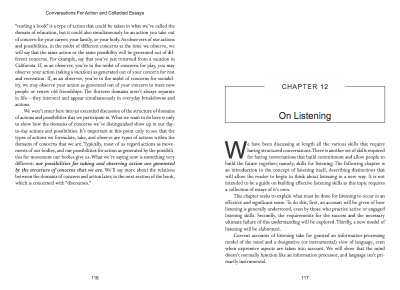Chapter 12: On Listening
This essay provides a glimpse of Fernando Flores’ view on background and disclosive space. Conversations always take place against the background of some cultural understanding. As people form working relationships, new background’s of understanding are produced—also called disclosive space. This essay introduces the distinction of disclosive space in the context of listening.
Nearly, everyone concedes now that listening to another person is a difficult task to master. It requires more than just hearing and understanding the words enunciated. It also requires figuring out what the other person just assumes and therefore leaves unsaid. It demands, that is, a sense of the other person’s perspective and concerns. Additionally, effective listening requires attentiveness to the expressive side of a person’s language, the facial expressions he or she makes the gestures, the tone of the speech, and the rest. And finally listening requires the auditor to possess the basic skills necessary for inhabiting the perspective of the speaker. For without those skills, listening becomes a matter of just recording. It is not responsive, and listening in its strongest, best sense must always be guided by the endeavor to respond to the speaker. This paper will seek to explain what is going ton with listening and what must be done for listening to really occur in an effective and significant sense. To do this, first, an account will be given of how listening is generally understood, even by the practitioners of the new active or engaged listening skills. Second, the requirements the success and the necessary ultimate failure of this understanding will be explored. Third, an new model of listening will be elaborated in its three primary aspects. Roughly, this account will argue that current accounts of listening take for granted an information-processing model of the mind and a designative (or instrumental) view of language (even when expressive aspects are taken into account). But, this paper will argue, the mind does not normally function like an information processor. And language is not primarily designative or instrumental. A genuine understanding of listening ought to depend upon how people act when things are going along smoothly or when successful innovations are being made.
A new paradigm of disclosive listening will, then , be developed where , the first instance, listeners attend to the dimensions in which speaking takes place in their customer’s company and become attuned to that. All these rough-hewn terms will be worked out in what follows.

Jump to chapter: